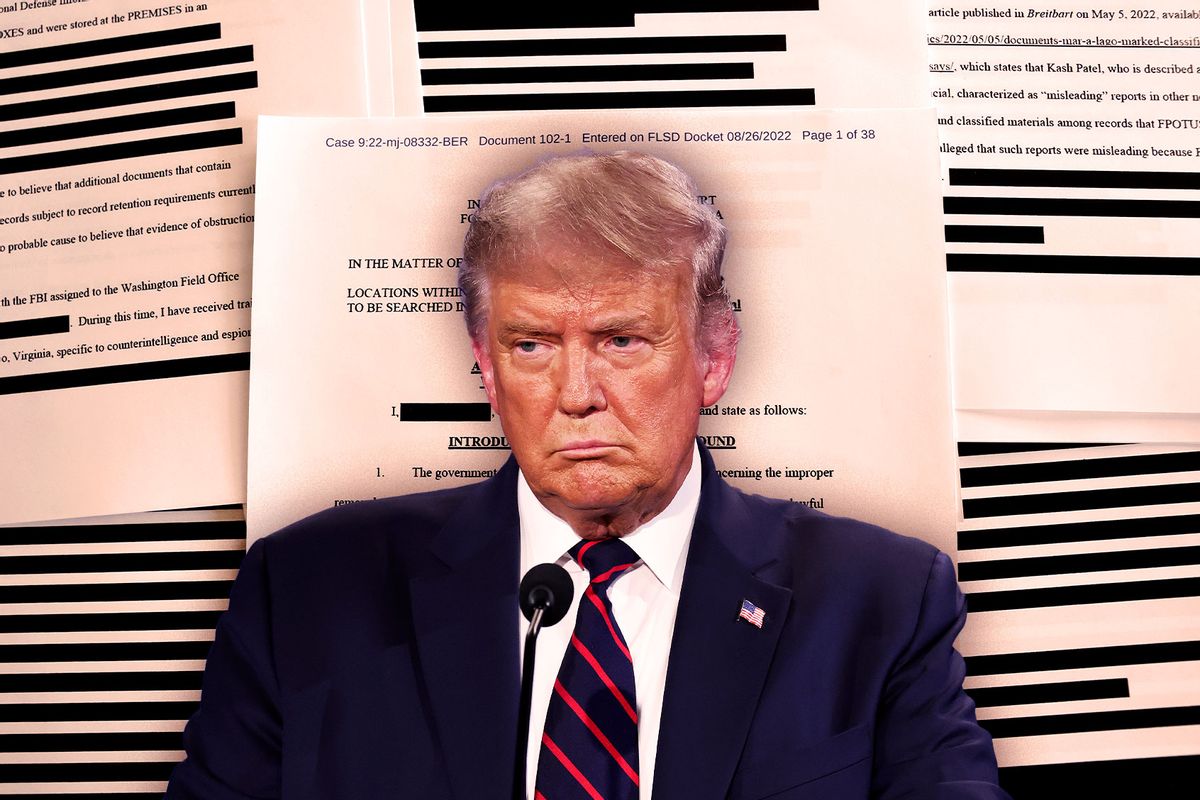Donald Trump has an indisputably delusional view of what it takes to declassify national security secrets, recently claiming that he, as president, could have declassified documents just "by thinking about it." As much as Trump's latest self-serving crazy makes for good late-night comedy fodder, it also reminds us how much absurdity the U.S. government has created in national security litigation. As attorneys for whistleblowers and media sources, our cases have been the breeding ground for abuse of the broken classification system.
Beneath the public laugh-fest over Trump's outlandish claims of telepathic declassification powers lies the implication that somewhere, somehow, there is a clear, fair process for doing so. But in reality, the classification system is plagued by over-classification and is routinely misused and abused to control the free flow of information to the public, rather than to protect national security. For example, when the Biden administration recently wanted to promote its move to require more systemic oversight for drone strikes, a senior administration official anonymously discussed the classified policy with the New York Times.
However, our client — Afghan war veteran and drone whistleblower Daniel Hale — is serving a 45-month prison sentence after pleading guilty to sharing information with the media about inaccurate targeting and underreported civilian casualties from this lethal "precision" technology. The fact that Hale is in prison for raising the alarm about the drone program, while government officials openly discuss the program with reporters when the government is seeking to appear careful rather than criminal, thoroughly undermines any claim that secrecy is necessary in order to protect national security.
As Chelsea Manning put it so eloquently when discussing her experience as a whistleblower: "I knew the official version of why these secrets had to be kept secret. We were protecting sources. We were protecting troop movements. We were protecting national security. Those things made sense. But it also seemed, to me, that we were protecting ourselves."
The U.S. government's own damage assessment report bolsters Manning's position, finding that her disclosures did no real harm to national security. The 2011 report, which completely excoriated the government's frantic assertions that Manning's whistleblowing gravely harmed the U.S., was kept secret (including from Manning's criminal defense team) until it was wrenched into public view by journalist Jason Leopold in a Freedom of Information Act (FOIA) lawsuit years after the case ended. (National security and intelligence officials do not look kindly on Leopold's efforts to inform the public using FOIA, a law intended to promote government transparency. Perverting the very purpose of the law, government officials deemed him a "FOIA Terrorist.")
The argument against whistleblowers like Manning, and more recently Daniel Hale, is often that they should not take it upon themselves to unilaterally decide what classified information should be made public. But other whistleblower cases demonstrate that the government's official decision-making (not just Trump telepathy) on when to declassify information is at best sloppy and at worst corrupt and used to punish whistleblowers.
Want a daily wrap-up of all the news and commentary Salon has to offer? Subscribe to our morning newsletter, Crash Course.
No one knows that corruption better than our client NSA whistleblower Thomas Drake, whose case Manning and NSA whistleblower Edward Snowden followed closely. Classification expert J. William Leonard was so alarmed at the abuse of the classification system in Drake's case that he filed a formal complaint after the prosecution of Drake collapsed. Leonard sought accountability for the government's dubious claim that an email found in Drake's house was classified. That email served as the basis of an Espionage Act charge carrying a possible decade-long prison sentence for Drake — but as it turned out, the information never should have been classified in the first place.
Routine misuse of the classification system — to silence whistleblowers, cover up government crimes or selectively leak information — undermines its legitimacy, even for legitimate government secrets.
Leonard put it bluntly when later writing about it: "Every 6-year-old knows what a secret is. But apparently our nation's national security establishment does not." Years later, Leonard served as an expert in NSA whistleblower Reality Winner's case, writing that she should receive a pardon in part because less than a month after her case ended, Robert S. Mueller III released the same information contained in Winner's disclosure when he charged 12 Russian officers with election interference. Winner has not received a pardon; instead, she served a 65-month sentence, the longest ever imposed by a federal court for disclosure of information to the media, for giving a single, one-page, entirely accurate document to the media.
The routine misappropriation of the classification system — as a blunt instrument to silence whistleblowers, a blanket to cover up government crimes or a tool to selectively leak information favorable to the current presidential administration — undermines the legitimacy of all classified information, even for legitimate government secrets. Secrecy expert Steven Aftergood aptly dubbed the current classification system as suffering a "credibility crisis." Congress did attempt to reform the declassification process in 2021, but there's not much to say about that here because some of the proposed declassification rules were, ironically enough, kept classified. We can hope that "Presidential Extrasensory Powers" are not included. But in all seriousness, Trump's latest claim of overly broad presidential power to declassify documents should raise sobering questions about the government's byzantine classification system and how it is used.
Read more
about Trump and those documents



Shares